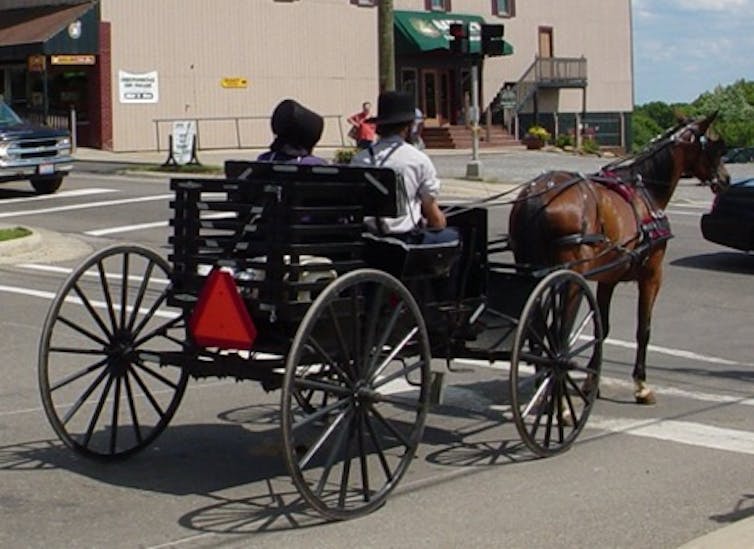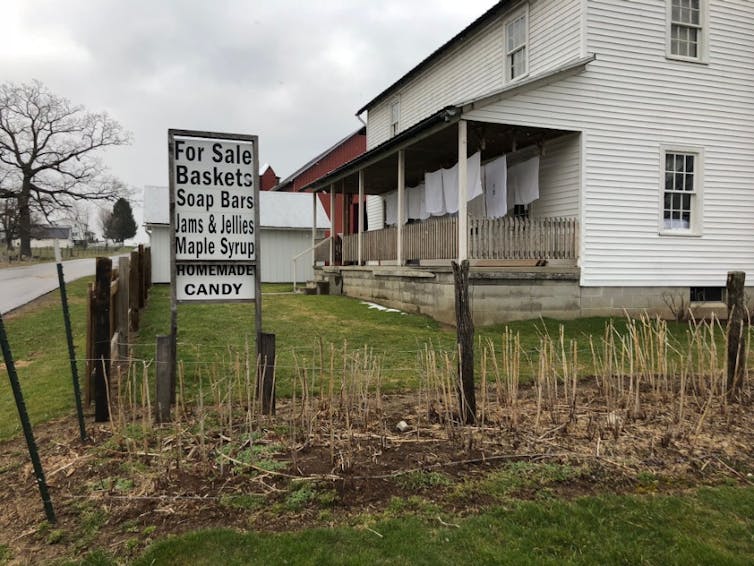
By Susan L Trollinger
Ohio’s Amish Country, located in the northeastern part of the state, draws over 4 million visitors every year – second only to Cedar Point amusement park as the Buckeye State’s most popular tourist attraction.
October, with its cooler temperatures and spectacular colors, is the region’s peak month for tourist traffic. Hundreds of thousands of tourists descend on the area in the fall to shop for Amish-made furniture, enjoy buggy rides and visit small towns that many Americans romanticize as bucolic escapes from the world.
And what will they find in the shops that line the main streets of towns like Berlin, Sugarcreek and Walnut Creek? Among other things, a plethora of items that feature Christian nationalist motifs, intense patriotism and ominous suggestions of violence – all antithetical to the core values of the Amish.
The reality is that Amish Country tourism has long been at odds with the plain and simple life of the Amish – a discrepancy at the heart of my 2012 book “Selling the Amish: The Tourism of Nostalgia.”
A life apart
Descended from Anabaptist immigrants who fled religious persecution in Europe, the Amish typically live in rural areas where they seek to live a different sort of life, resisting aspects of contemporary American culture that undermine their commitments to church, family and community.

Susan Trollinger
To live at a slower pace, they drive horse-drawn buggies instead of cars. To pursue their calling to follow Jesus rather than chase personal ambitions, they stop school after eighth grade. To avoid the distractions of consumer culture, they prohibit TVs and internet connections in their homes. And to keep themselves humble, they yield to communal rules about dressing plainly, living in modest homes and keeping their businesses small.
Seeking to follow Jesus, they embrace nonviolence and find inspiration in the story of a 16th-century Anabaptist, Dirk Willems, who was imprisoned for his faith. He escaped, but because of his commitments to love his enemy, he turned back when he saw that his captor had fallen through the ice. His captor survived to witness Willems being burned at the stake.
Out of their deep commitment to separation between church and state, the Amish refuse to swear oaths, receive Social Security benefits or join the military. That’s why you won’t see an American flag in an Amish school or hear Amish students recite the Pledge of Allegiance.
The ‘Amish brand’
Yet tourist towns capitalizing on what has become the “Amish brand” are full of gift shops selling merchandise you would not expect to find in an Amish home – Uncle Sam cutouts, Mickey Mouse yard flags, ornate lace curtains and Elvis Presley figurines.
As a scholar of rhetoric and religion, I’ve long been curious about Amish Country tourism, since it seemed – at least on the face of it – to have so little to do with the Amish themselves. “Selling the Amish” was my attempt to explain why many Americans found Amish Country so compelling.
My answer was that Amish Country tourism afforded visitors a nostalgic experience of a “simpler time” when Americans could imagine that they were in control of technology; that men were “men” and women were “women”; and that families sat down to Mom’s home-cooked meal every evening.
The region’s tourist towns play into this nostalgic desire that visitors have for a future that resembles an imagined past. In that imagined future, they would, like the Amish, escape cultural forces that they think have compromised America’s ability to be the Christian nation it supposedly once was.
A glimpse of real life
Since 2008, I’ve taken students from the University of Dayton to the Amish settlement located in Holmes and Wayne counties in northeastern Ohio.

Susan Trollinger
In the course of the day, we visit a two-room school run by New Order Amish, whose rules for daily life are among the least strict among the Amish. Then we’re off to a candle shop owned and operated by five Old Order Amish sisters, followed by a visit to a Swartzentruber Amish farm. The Swartzentruber are among the strictest Amish groups. In the small shop located between the house and a woodworking shop, a young woman sells woven baskets, homemade preserves and wood furnishings crafted by her father. We also enjoy meals and conversation at two Amish homes.
Of course, the stops we make are part of the tourism industry. And many Amish make their living from that industry, whether they are crafting solid wood furniture, serving diners in Amish-style restaurants or preparing hotel rooms for guests.
Importantly, the Amish don’t own the big Amish-style restaurants or gift shops or hotels. And because I want my students to have conversations with the people they have been studying, we spend very little time in these tourist towns.
When I was invited to present a paper last summer on Amish Country tourism – an update of “Selling the Amish,” as it were – I was obliged to spend some time in those tourist towns.
Guns and crosses
What I saw blew me away. There I was in the heart of the biggest Amish settlement in the world, when measured by the number of congregations. This area is home to nearly 40,000 Amish people deeply committed to pacifism: people who would rather suffer solitary confinement and reduced rations – as some did during World War I – than participate in “the war machine,” and who would never sing the national anthem.

Susan Trollinger
Yet, I saw the Stars and Stripes everywhere: on T-shirts, ball caps, decorative wreaths, candles and, perhaps most strikingly, wooden crosses. There were concrete statues of soldiers kneeling at crosses, patriotic bunting and images of the Founding Fathers, with facsimiles of the Declaration of Independence, the Ten Commandments and the Pledge of Allegiance nearby.
A large display in one Berlin shop featured merchandise from “Hold Fast,” a company whose website says its merchandise is designed “for freedom loving Americans who want to see Biblical values preserved and are taking a stand and letting their voices be heard.” Flags figure prominently across the merchandise, along with messages like: “One nation under God. Psalm 33:12. Hold Fast.”
I was even more taken aback by home decor items announcing that the “2nd Amendment is my gun permit,” along with thermoses challenging government authorities to “come and take it” – “it” being a gun – and coffee mugs that listed gun calibers (.22, .380, 9 mm, .40, .45) and proclaiming, “All faster than dialing 911.”
Amish Country tourism has never simply been about the plain and simple life of the Amish. But these days, sites that fuse Christian symbols and sacred texts with a brand of nationalism that celebrates masculine bravado, guns and the military marks a further and dramatic remove from the character of Amish life.
Still, if one ventures down a back road and ends up behind a slow-moving buggy, or ducks into an Amish-owned shop selling bulk foods, handmade brooms or half-moon pies, they can still encounter a people whose life is wildly at odds with so much that characterizes mainstream America today.
![]()
Susan L Trollinger is Professor of English at the University of Dayton.





























Michael Cocchiola says
Religious hypocrisy has no bounds.
David Frank says
You are what you are,
Greg says
Don’t even talk about the pledge of allegiance in schools. They don’t do that in public schools! I lived in Lancaster County Pa most of my life. Filled with hard working, God fearing Amish. Can’t blame them a bit from staying away from a corrupt government such as we have in America. Leave these people alone, they bother nobody and practice their religion, that offends nobody!
Laurel says
What a sad story! I cannot believe that the supposed believers of Jesus are turning him into an intolerant militant. Money rules everyone these days.
R.S. says
I have known the Amish to be oblivious to what may happen in their name. So what the “English” are doing is the “English’s” business. One cannot blame the Amish. However, the Amish also practice their forms of cruelty. The “Meidung” [shunning] is in practice for whoever does not follow the strict rules of the various orders of Amish. The “Meidung” excludes the culprit from all of family life, all contacts, all common meals, and all connections to others of the order. Also the various orders are strictly separated. It takes years of discussions before one may step from buggies without rubberized wheel rims to adding the rubber cushioning, from a plain buggy to showing a warning triangle at the back. Marriage does not follow love; it follows the order: it is permitted to marry into a stricter order, not the other way ’round. For all their peaceful intentions, the Amish are also merely humans with all the foibles and follies of the rest of us. On the other hand, I will never forget the evening of singing old German folk songs amongst and with a group of Indiana Amish and debating biblical language with the elder there. Those folks were most gracious hosts.
Pierre Tristam says
Odd how religion, so usually fueled by moral codes, ends up turning those very codes into merciless cudgels as that other fuel of so many religions–fear-born dogma–reverses ends and means.
Laurel says
Religion has convinced people that there’s an invisible man … living in the sky. Who watches everything you do every minute of every day. And the invisible man has a list of ten specific things he doesn’t want you to do. And if you do any of these things, he will send you to a special place, of burning and fire and smoke and torture and anguish for you to live forever, and suffer, and suffer, and burn, and scream, until the end of time. But he loves you. He loves you. He loves you and he needs money.
– George Carlin